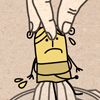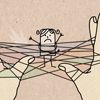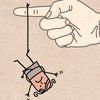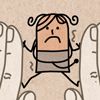That 'out of control' feeling in veterinary medicine
Do you pull the strings in your life and career? Or do you think luck, fate and other people are the deciding factor in your happiness and success?
Some people, even in bad circumstances, feel they have control over their lives. Psychologist Julian Rotter calls that an "internal" locus of control. Compare that to people who feel they don't have power over their lives, their actions, their families or their jobs-people with an "external locus of control."
Some researchers say happier people have an internal locus of control.
So, what about you?
Take this quiz, then come back here to learn more.
Where'd all this "locus of control" stuff come from?
"Locus of control," a social learning theory developed by psychologist Julian Rotter, PhD, asserts that personality represents the interaction of an individual with their environment and is changeable given the circumstances of the situation. People with an internal locus of control feel that they are in control of their destiny, while people who have an external locus of control believe that external forces control their future.
Are you convinced you're doomed-Groundhog Day style-to face clients day after day who won't take your recommendations? External locus of control-the pet owners govern your fate! Or do you work to soothe your frustration about that or adjust the way you communicate with pet owners? Internal locus of control-there's something you can do, even if it's to let go of bad feelings from the workday.
Do you feel trapped in your job with coworkers you hate with no way out? That's external locus of control-you have no power over your job, your bosses, your coworkers or your daily responsibilities. Or are you considering that you're choosing to stay because of the location or the clients or the money, or even better, maybe you're brushing up that resume and learning new skills? That's internal locus of control-you're recognizing that you have a choice, even if you choose not to leave.
Choosing change isn't always easy (Dr. Dean Scott gives the "Negative Ned" side to this here), but the more you tell yourself you're fated to misery and unhappiness and the world is conspiring against you, maybe-just maybe-the more miserable and unhappy you feel.
But don't take our word for it. Let's dive in ...

Quiz: Are you getting squeezed by life?
When life in veterinary medicine gives you lemons, do you make lemonade ... or get squished? Find out more about how you see the world with this quick quiz.

Go inward: How locus of control can save you
Believing you have some control over the events in your life is crucial to happiness and could make a huge difference in your personal life and veterinary career.

Veterinary confessionals: In control ... or out?
We selected confessions from the Vet Confessionals Project that reflect the feelings of control (or lack thereof) that plague the profession.

The positive power of negativity
People with an internal "locus of control"-who believe that they have control over their destinies and that their actions matter-may be happier and healthier. But making changes in your life isn't as easy for everybody, and we need to acknowledge that more than we do.

Game of Thrones: Are veterinary leaders born or made?
Deb Stone, PhD, studied "locus of control" and its potential impact on veterinary leadership. Dr. Hilal Dogan went one step further with the ideas: What does the hit HBO show have to teach us about leading in veterinary medicine? Are you Stark, Lannister, a Direwolf or one or those misfit leaders?
Like Ted Talks? Us too ...
Here are a few on the topic of choice, decision-making and locus of control. Are they inspired, aggravating or eye-rollingly cringy? Let us know at dvm360@ubm.com.
Are we in control of our own decisions?
Behavioral economist Dan Ariely, PhD, uses classic visual illusions and his own seemingly counterintuitive research to prove that we're not as rational as we think when making decisions.
The art of choosing
Sheena Iyengar, PhD, a psycho-economist, studies how we make choices and shares her research full of surprises about our attitudes toward decisions.
Getting stuck in the negatives (and how to get unstuck)
Social psychologist Alison Ledgerwood, PhD, wants to understand how people think and how they can think better. Her research investigates how certain ways of thinking about an issue tend to stick in people's heads.